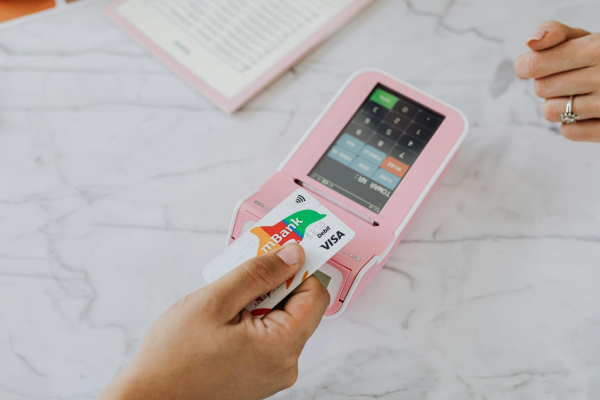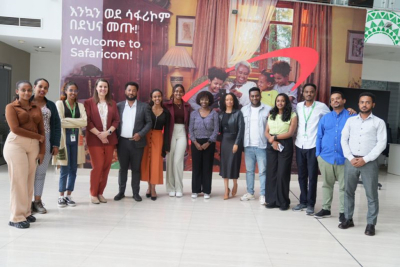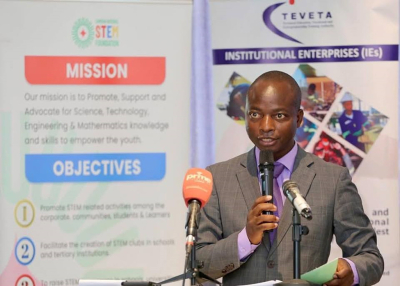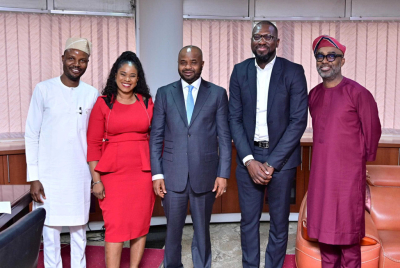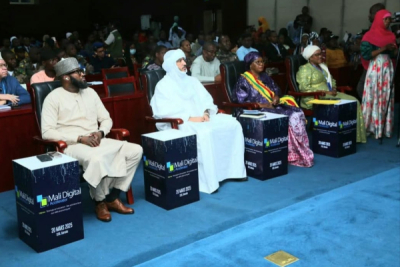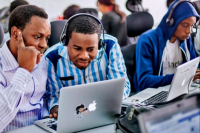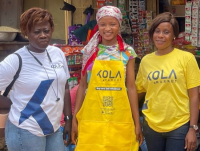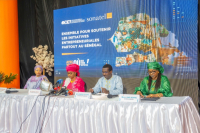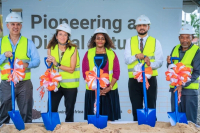- Morocco will install 4,000 smart surveillance cameras in Rabat by end of 2025
- The $10.4 million project is led by Rabat Région Aménagements, Finatech and Alomra Group handling infrastructure and deployment
- Equiped with with facial recognition and license plate reading, the cameras aim at enhancing urban security and traffic management
Morocco is set to install 4,000 smart surveillance cameras in its capital, Rabat, by year-end, joining a global trend of increased investment in video surveillance technology driven by advances in facial recognition and automated data analysis.
The project, spearheaded by public entity Rabat Région Aménagements, carries a budget of approximately 100 million dirhams ($10.4 million). Finatech Group will handle the installation of command and data collection centers, while Alomra Group International will deploy the cameras, which will feature facial recognition and automated license plate reading capabilities.
This initiative aligns with Morocco's digital transformation strategy and its preparations for major international events, including the 2025 Africa Cup of Nations and the 2030 World Cup, which it will co-host with Spain and Portugal. The deployment aims to enhance security and improve population flow management.
According to a report by Mordor Intelligence, the global video surveillance systems market is projected to grow from $81.68 billion in 2024 to $145.38 billion by 2029, representing a compound annual growth rate of 12.22%. Several African nations, including Senegal, Côte d’Ivoire, and the Seychelles, have also recently invested in these technologies to bolster urban security and optimize public space management.
While proponents emphasize the benefits of smart surveillance in crime prevention and traffic management, concerns remain regarding personal data protection and individual freedoms. Morocco’s National Commission for the Control of Personal Data Protection (CNDP) has initiated hearings to regulate the use of these technologies and ensure compliance with Law 09-08, the country’s personal data protection law.
The challenge, as Morocco advances in smart city management, is to balance security innovation with the safeguarding of citizens’ rights.
By Samira Njoya,
Editing by Sèna D. B. de Sodji
Visa’s investment is expected to boost employment, attract more foreign investment, and stimulate Nigeria’s economy. It will help position Nigeria as a regional tech hub.
Visa Inc., a global payment services provider, has announced its intention to set up data center infrastructure in Nigeria, reaffirming its dedication to the nation's digital economy. This development was shared by Mr. Andrew Torre, Visa's Regional President for CEMEA, during a courtesy visit to Vice President Kashim Shettima at the Presidential Villa in Abuja, as highlighted in a March 21 press release from the Nigerian Presidency.
Mr. Torre stated that Visa’s continued investment in Nigeria is aimed at introducing new technologies that will enhance the country’s financial ecosystem. He highlighted that global partners like Hugo and Samsung require Visa’s technology to expand mobile payment services, making transactions more efficient and cost-effective.
The move is in addition to Visa’s over $1 billion investment in Nigeria, which includes a partnership with MoniePoint to drive digital payment adoption, $200 million investment in digital payment company Interswitch, and a collaboration with ThriveAgric to support smallholder farmers and enhance food security in Nigeria.
Visa’s planned data centre will play a key role in bolstering Nigeria’s digital payment infrastructure, improving transaction speed, cybersecurity, and access to financial services for millions of Nigerians.
Vice President Shettima welcomed Visa’s commitment to expanding its footprint in Nigeria, assuring the company of continued government support. He emphasized Nigeria’s growing fintech dominance, noting that eight of Africa’s ten leading fintech companies are Nigerian-based.
According to McKinsey's 2020 report, Harnessing Nigeria’s Fintech Potential, Nigeria is home to over 200 fintech companies, alongside fintech solutions from banks and mobile operators. Between 2014 and 2019, the sector raised over $600 million, including $122 million in 2019, accounting for 25% of Africa’s $491.6 million second only to Kenya’s $149 million.
Visa’s $1B+ investment and planned data centre reinforce Nigeria’s fintech leadership, accelerating digital transformation, financial inclusion, and economic growth.
Hikmatu Bilali
Safaricom Ethiopia announced on March 19 that it hosted GSMA on a workshop to close digital access gaps, particularly in gender and usage disparities.
Held at Safaricom Ethiopia’s headquarters, the session brought together Consumer Business Unit (CBU) employees and GSMA experts to address barriers like handset affordability and digital literacy. Participants explored scalable, sustainable solutions and outlined a roadmap to expand digital access.
This collaboration reinforces Safaricom Ethiopia’s commitment to making digital transformation inclusive and accessible for all.
The Zambia National STEM Foundation (ZNSF) and TEVETA have signed an MoU with the Zambia Federation of Employers (ZFE) and Agricultural Institute of Zambia (AIZ) to enhance Work-Based Learning (WBL) and boost STEM adoption in vocational training. The announcement was made on March 19.
Ministry of Technology and Science Permanent Secretary, Dr. Brilliant Habeenzu, emphasized the partnership’s role in closing skills gaps and aligning training with industry needs.
ZNSF remains committed to equipping Zambia’s workforce with industry-relevant STEM skills for the evolving job market.
Digital payment systems increase transparency, reduce leakages, and provide real-time tracking, ensuring more tax revenue reaches the government. By digitizing tax payments, the collaboration modernizes government collections, improves efficiency, and builds taxpayer trust through greater transparency.
The Nigerian Federal Inland Revenue Service (FIRS) has partnered with African payments technology company Flutterwave to enable digital tax collections. This was announced on March 20. It makes Flutterwave one of the few fintechs modernizing government payments.
Olugbenga ‘GB’ Agboola, CEO of Flutterwave, stated: "We are committed to leveraging technology to drive efficiency and economic growth. By simplifying tax payments, we are digitizing government collections and supporting national development in line with our mission."
Through this integration, businesses and individuals across Nigeria can now pay taxes, levies, and other obligations via Flutterwave’s secure and seamless payment infrastructure. The system offers real-time tracking, diverse digital payment options, offline payment capabilities, and enhanced transparency, ensuring a faster and more accessible tax payment experience.
According to the Nigerian Bureau of Statistics, Nigeria's tax-to-GDP ratio stood at 10.86% as of 2021. The country’s fragmented tax system, which hinders revenue growth, is cited as one of the reasons for this low figure. By digitalizing payments and improving accessibility, the collaboration centralizes tax collection, reduces bottlenecks, encourages compliance, and helps boost government revenue.
This partnership aligns with FIRS’ modernization efforts, which include the adoption of technology for transparency and efficiency, offering Nigerians a streamlined way to fulfill their tax obligations.
Hikmatu Bilali
- The initiative stems from Mali Digital Awards, supporting local startups
- It offers tailored support, funding, and market access, aiming to foster "Made in Mali" digital leaders
The Malian government inaugurated the Mali Digital Accelerator on Thursday, March 20, a program designed to support the development of the national tech ecosystem. The program will provide startups with tailored support, strategic funding, and market access.
The initiative aligns with the government’s ambition to build a strong and resilient digital economy, leveraging technology for economic growth, modernization, and prosperity. The government aims to foster the emergence of "Made in Mali" digital leaders.
According to the Ministry of Communication, Digital Economy, and Administrative Modernization, the program will address challenges faced by sector players, including funding shortages, lack of mentorship, and infrastructure access difficulties.
The International Finance Corporation (IFC) supports this view, emphasizing that accelerators can unlock startup potential in emerging markets. "Accelerators scout for high-growth potential entrepreneurs and provide training, mentorship, and networking, often alongside seed capital. They help entrepreneurs grow their business faster, or recognize when their ideas are not viable, encouraging them to pivot or exit the market. Successful participation in recognized acceleration programs also signals quality to investors, helping promising firms secure additional funding," the IFC said in a report published in February 2025.
The IFC stressed that effective accelerators in low-income countries must align incentives with local market conditions. The institution recommended integrating into regional investment networks, strengthening connections with the local private sector, and fostering angel investment and venture capital networks in lower-middle-income countries.
"Accelerators can focus on specialization and scale in more developed emerging markets—creating industry-specific programs, building cross-border networks for market expansion, and connecting local startups to global value chains," the IFC added.
By Isaac K. Kassouwi,
Editing by Sèna D. B. de Sodji
Nigeria is home to one of Africa’s most dynamic tech ecosystems. However, a slowdown in funding is beginning to hinder the growth of startups. Through new initiatives, the government aims to stimulate innovation and provide essential support to emerging companies.
Nigeria plans to launch a $40 million fund to support early-stage tech startups, aiming to strengthen the country’s entrepreneurial ecosystem and reduce young companies’ reliance on private investors, officials said.
The fund will be equally financed by the Japan International Cooperation Agency (JICA) and the Nigeria Sovereign Investment Authority (NSIA), which manages the national sovereign wealth fund. Kashifu Inuwa Abdullahi, director of the National Information Technology Development Agency (NITDA), confirmed the final agreement would be signed within the next month.
The initiative is part of Nigeria’s Startup Act, adopted in October 2022, which aims to create a favorable environment for startups through tax incentives and financial support. The act established a 10 billion naira (approximately $8.6 million) annual fund to finance certified startups through seed funding, grants, or loans.
According to Disrupt Africa, Nigeria’s startup ecosystem attracted over $2 billion in investments between January 2015 and August 2022, positioning the country as Africa’s leader. Companies like Flutterwave, Andela, and Opay achieved multi-billion-dollar valuations. However, fundraising dropped to $224 million in 2023, down from $531 million in 2022 and over $1 billion in 2021. This decline highlights the need for government intervention to revitalize the tech ecosystem amid investor caution.
The new fund marks a significant step for Nigeria, which aims to foster local innovation. Currently, 12,948 companies are registered as startups, benefiting from a three-year tax exemption. Low awareness of the law’s benefits has prompted the government to plan a nationwide information campaign.
By facilitating access to funding, the initiative could strengthen support for existing startups and stimulate new tech ventures, reinforcing Nigeria’s position as a leading hub for digital innovation in Africa.
By Samira Njoya,
Editing by Sèna D. B. de Sodji
By combining modern technology with an understanding of African market dynamics, this startup aims to empower local entrepreneurs, drive innovation, and create sustainable economic opportunities.
Kola Market is an online marketplace developed by a Ghanaian startup, providing local entrepreneurs with digital tools to optimize business operations and increase profitability.
Founded in 2021 by Marie-Reine Seshie, the startup operates from Newark, United States, and Accra, Ghana.
Kola Market serves as a platform for businesses to sell inventory through efficient online sales channels, increasing visibility and commercial opportunities. The marketplace offers advanced analytics tools, enabling users to access real-time stock level information, identify best-selling products, and analyze customer purchasing trends for strategic decision-making.
The marketplace addresses challenges faced by African small and medium-sized enterprises in the commerce sector, including overstocking, order forecasting, and stock alignment. It automates the ordering process, reducing human errors and ensuring product availability. The platform utilizes artificial intelligence to align stock levels with demand, minimizing losses.
The platform is accessible through a mobile application available on iOS and Android, with more than 1,000 downloads, according to Play Store data. In April 2024, the startup was selected, along with two other startups, to receive $200,000 in pre-seed funding from Madica, an Africa-focused investment program. The funding will enable the marketplace to test new features and expand operations.
By Adoni Conrad Quenum,
Editing by Feriol Bewa
- DER/FJ and Sonatel partner to enhance digital inclusion and innovation
- Under the partnership, Bambey digital campus will become an innovation hub
- Training programs are to be delivered to youth and women through digital hubs and Orange Digital Centers
Senegal's General Delegation for Rapid Entrepreneurship of Women and Youth (DER/FJ) has entered into a strategic partnership with Sonatel, aimed at accelerating digital entrepreneurship. The partnership, formalized on Monday, March 17, seeks to enhance digital inclusion and foster a competitive digital entrepreneurial ecosystem through targeted initiatives.
The project will harness technological innovation to drive social and economic inclusion, with the partners combining resources to cultivate new leaders in the innovation sector. A key component of the collaboration involves transforming the Bambey digital campus into an innovation hub, designed to equip young Senegalese with advanced digital skills for future employment.
The partnership will also include tailored training programs for youth and women, delivered through digital hubs in regional branches and Orange Digital Centers (ODCs). These centers, which officials have noted are effective as business accelerators, will serve as platforms for a dynamic and innovative entrepreneurial environment.
This collaboration aligns with broader efforts to create an environment conducive to local talent development. It also represents a step toward achieving Senegal 2050 and the country's New Technological Deal, the national digital transformation strategy. The New Technological Deal aims to certify five hundred tech startups and create 150,000 direct jobs by 2034.
Sonatel's initiatives, including the Orange Startup Center and Orange Digital Center, have trained over 39,000 young people since 2019, with a reported 95% job placement rate in Senegal. In 2024, Sonatel invested 800 million CFA francs ($1.3 million) in Senegalese startups and supported 1,600 women through its Maisons Digitales program.
By Samira Njoya,
Editing by Sèna D. B. de Sodji
- This marks the second phase of its data center expansion
- The first phase was completed in 2022 with the construction of a Tier 3 data center
Pan-African data center operator Wingu Group announced the second phase of its Dar es Salaam data center expansion on Tuesday, March 18, aiming to better serve its clients' evolving needs.
Wingu's existing Tanzanian data center, certified Tier 3 by the Uptime Institute, ensures uninterrupted maintenance through redundant equipment and circuits. Its power supply and cooling systems utilize multiple redundant paths, limiting downtime to 1.6 hours annually. The facility is carrier-neutral, accommodating all providers.
"Among the key enhancements is doubling in rack power to support energy-intensive applications with superior efficiency. The facility now offers considerably more white space to accommodate additional racks, pods, and cages, ensuring that it can readily grow to meet the increasing demands of modern digital operations," the company stated in a press release.
This expansion seeks to solidify Wingu's position in a rapidly expanding market, fueled by Tanzania's ongoing digital transformation. According to Statista, Tanzania's data center market is projected to generate $108.97 million in revenue by 2025, with an anticipated average annual growth rate of 7.54%, reaching $145.74 million by 2029.
However, Wingu faces competition in Tanzania's data center market. Raxio Group is currently constructing a carrier-neutral Tier 3 data center in Dar es Salaam. Additionally, IT services provider Oman Data Park has signed a memorandum of understanding to build a data center in Zanzibar.
By Isaac K. Kassouwi,
Editing by Sèna D. B. de Sodji
More...
Africa-focused private equity firm Alterra Capital Partners secured, on March 17, a $20 million investment from British International Investment (BII) for its Alterra Africa Accelerator Fund (AAA Fund). The fund, targeting $400 million, supports businesses driving financial inclusion, digital growth, and job creation in East and Southern Africa.
The AAA Fund, which closed its first round at $140 million, is backed by IFC, Norfund AS, DEG, Standard Bank, Allianz AfricaGrow Fund, and Public Investment Corporation.
With BII’s backing, Alterra aims to accelerate sustainable growth across the continent.
Africa has the world’s youngest population, yet a major skills gap threatens growth. Providing digital education ensures economic opportunities for this rapidly growing workforce. By providingscholarships, this initiative directly contributes to closing the skills gap, fostering job creation, and accelerating Africa’s digital transformation.
AltSchool Africa, a talent company that equips Africans with the knowledge, skills, and resources, announced on March 18 that it has partnered with Bybit, a global cryptocurrency and blockchain leader, to sponsor 1,000 scholarships for young Africans, equipping them with in-demand digital skills.
Adewale Yusuf, CEO of AltSchool Africa, stated: “This sponsorship goes beyond a traditional scholarship program. It represents a shared vision for a future where young Africans are not only tech-savvy but also empowered to lead their communities into a prosperous digital age.”
Through this initiative, scholars will enroll in AltSchool Africa’s Diploma program, covering software engineering, data analysis, and product management. The program also includes mentorship, career counseling, and hands-on projects to prepare students for the global tech industry.
Bybit COO Helen Liu emphasized: “Education is key to progress. Through our partnership and the Bybit Academy, we’re committed to fostering innovation and future-proofing Africa’s talent.”
This partnership addresses Africa’s growing digital skills gap, a critical challenge as the continent faces an increasing demand for tech talent. According to the International Finance Corporation (IFC), Africa will need 230 million digital jobs by 2030, yet a significant skills shortage threatens economic growth. By providing 1,000 scholarships, AltSchool Africa and Bybit are helping bridge this gap, equipping young Africans with in-demand skills to thrive in the digital economy and drive innovation across the continent.
Hikmatu Bilali
Proparco and Equity Group, a Kenya based not-for-profit foundation, have signed a €1 million agreement to support the Climate Resilient Agri-Food Systems (CRAFS) project, an Equity Group Foundation (EGF) initiative helping Kenyan smallholder farmers adopt sustainable practices.
The signing took place in Nairobi, on March 18, attended by French Ambassador H.E. Arnaud Suquet, Proparco’s East Africa Director Jean Guyonnet-Dupérat, and Equity Group CEO Dr. James Mwangi.
CRAFS will train 15,000 farmers annually in climate-smart agriculture, covering energy use, sustainable farming, waste-to-energy, and water management. A field team and industry partners will support implementation.
Mastercard announced on March 17 that it is strengthening its partnership with Paymentology, a company that helps banks and fintechs create, manage, and process card payments, to simplify card issuance for South African fintechs.
This collaboration provides the expertise, infrastructure, and speed needed to scale payment solutions, driving financial inclusion and digital growth.
Mastercard offers global payments infrastructure and security, while Paymentology provides cloud-based processing and program management. Their combined expertise ensures faster, more efficient card issuance.



